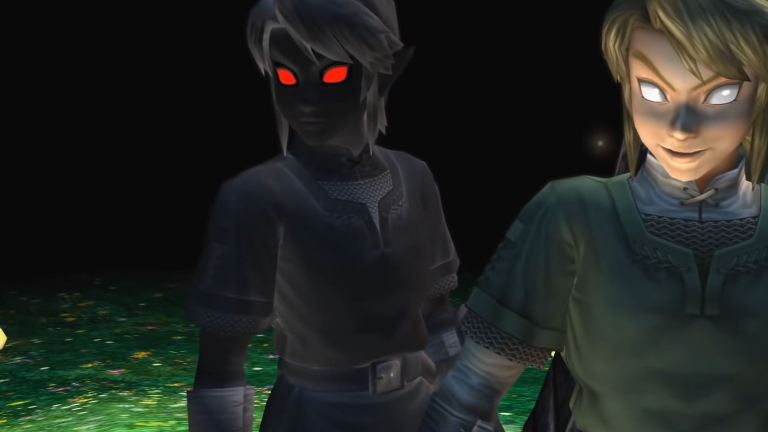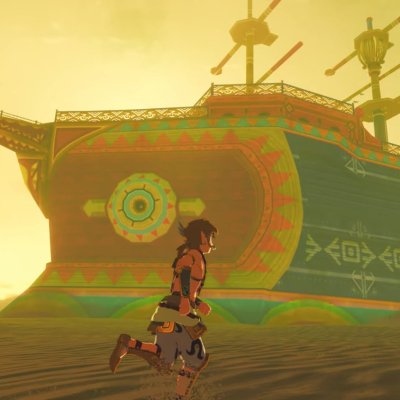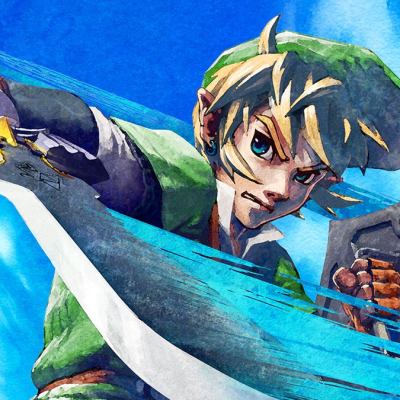The Legend of Zelda’s Wildest Fan Theory Says Link Is the Real Villain
One crazy Legend of Zelda fan theory says that the Hero of Time isn't actually a hero at all.

The world of Legend of Zelda fan theories is usually a pretty wild place (some fans still believe that Link and Zelda are brother and sister), but I’m not sure if I’ve ever heard a Zelda fan theory as crazy or amusing as the idea that the real villain of The Legend of Zelda franchise is Link himself.
Now, it’s possible that you’ve heard variations of this story before that essentially amount to “Link is occasionally a bit of jerk.” We’ve probably all joked about his fondness for smashing pots and swiping at chickens at one point or another, and it’s certainly amusing to think about how some of Link’s basic actions probably would ruin a Hyrulian NPC’s day.
This isn’t that, though. This particular theory is a truly wild deep dive into the Zelda universe that, at the very least, shows you how confusing and unwieldy the franchise timeline really is.
You may be wondering whether or not this is related to the theory that Breath of the Wild 2 will ultimately be a Ganondorf origin story that plays with the idea that Ganondorf is actually a kind of twisted hero/antihero (which is, itself, a popular fan theory). After all, if Ganondorf has been something of a tragic figure for years, then surely you could make the argument that his greatest rival could be seen as the “villain.”
However, that’s not really what we’re talking about here. While there are some who would certainly argue that the “Ganondorf is a tragic hero” and “Link is a villain” theories are naturally connected to some degree, the more popular version of this particular theory is based on the idea that so many of Hyrule’s darkest days can be attributed to Link’s actions (or, in some cases, lack of action). That has given rise to the idea that Link is somehow cursed.
Interestingly, there’s a degree to which that is true. After all, Link is the “Hero of Time” who is called upon and reincarnated when there’s a great evil that needs to be vanquished. There’s a bit of a “chicken and egg” thing at play here, but if you see Link running around Hyrule, it likely means that something very bad is actively happening. Legend of Zelda games would be pretty boring if that wasn’t the case.
Still, if you’re going to buy into the curse idea, you’d somehow need to prove that there is a canonical scenario in which Link being defeated somehow led to things getting better for Hyrule. Funnily enough, it turns out that actually happened. Well…kind of.
See, Ocarina of Time‘s ending splits the Zelda timeline into three branches: one where Link defeats Ganon and lives on as an adult, one where Link is sent back to his childhood after defeating Ganon, and one where Ganon/Ganondorf actually defeats Link. Each timeline eventually results in different Zelda mythologies/games.
For example, the “Link defeats Ganon as an adult” timeline (which plays out in The Wind Waker, Phantom Hourglass, and Spirit Tracks) is based on the idea that Ganondorf was eventually able to escape the prison he was confined to following Ocarina of Time. Because no new Hero of Time appeared, the three Golden Goddesses decided to flood the land and trap Ganondorf themselves. He eventually escaped, though, and the Hero of Time was resurrected once more.
In the “Child” timeline (which plays out in Majora’s Mask, Twilight Princess, and Four Swords), Link is able to live out the rest of his childhood following the events of Ocarina of Time, which strangely turns out to be kind of a blessing and a curse. After all, Majora’s Mask and Twilight Princess are not only two of the darkest Zelda games, but you could argue that some of the specific events that led to those games being so dark could have been avoided if Link hadn’t been allowed to stick around as long as he did in this timeline. Actually, the other timelines prove that things would have gone differently.
What about the timeline in which Link is defeated in Ocarina, though? Well, in that scenario, Ganondorf is able to achieve incredible power after wishing upon the Triforce, but the Knights of Hyrule are eventually able to hold him off long enough for the Seven Sages to seal Ganon and his army in the Dark World. That action leads to the events of A Link to the Past, Oracle of Seasons/Ages, and Link’s Awakening, but between those games and the events of the first Legend of Zelda, there’s actually a period in this timeline known simply as the “Golden Era” where Hyrule enjoys a prolonged period of peace and prosperity. Mind you, this period of prosperity occurs in the one timeline where Link is actually defeated.
That’s really the crux of this entire theory. If you had to pick one of those three timelines to live in, you’d probably pick the one that resulted from Link’s defeat. It’s not a perfect world (it never is), but it is at least kind of funny that Link’s defeat arguably resulted in the best overall outcome for Hyrule.
Of course, this theory is ultimately nothing more than a funny way to point out the fact that the grander Zelda timeline is, and will forever remain, a bit of a mess. After all, the most logical reason why the “Link is defeated” timeline results in a much more pleasant series of events is that it’s the timeline that houses the earlier (and therefore tonally lighter) games in the Legend of Zelda franchise. It’s odd that there’s even room to argue that Link being defeated eventually led to a new age of prosperity, but the smart money is on Nintendo not realizing that was the implication of their chronological decisions.
Besides, while things can often get pretty rough in the other timelines, each timeline features instances of Hyrule finding some way to take care of themselves to some degree without Link’s help (though they ultimately obviously still rely on him). Each of those timelines also features extended periods of peace that might not be known as the “Golden Era” but still lasted for generations. Furthermore, Hyrule endured some pretty rough years following Link’s defeat in Ocarina of Time. The Golden Era only occurred after Link returned to help Hyrule.
So far as fan theories go, though, this one at least deserves a little credit for giving us an excuse to look at The Legend of Zelda‘s timeline from a new perspective as well as dive into the ways that this series has always been more complicated than most of us probably gave it credit for the first time we played these games as kids.
It’s honestly fascinating that the Zelda mythology is open to such wild interpretations that can be made to appear even vaguely plausible. Granted, some of that room for interpretation was created by gaping plot holes, but once you accept that part of the fun of this franchise comes from tearing its mythology apart and piecing it back together again, it’s easier to appreciate the absurdity of its craziest fan theories.
Having said all of that, Link is absolutely kind of a jerk from time to time. Then again, if you were cursed to always save the day only to have people on the internet speculate that you’re the source of every problem, you might occasionally act out as well.


